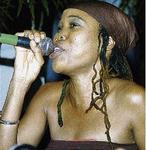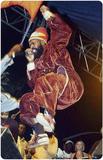

Mark Titus/Freelance Photographer
LEFT: Queen Ifrica has released an album called 'Fyah Muma'.
Winston Sill/Freelance Photographer
RIGHT: Deejay Capleton performs at the Jamaica Cultural Development Commission's 'Get Up Stand Up' concert in honour of Bob Marley's birthday, held at the Ranny Williams Entertainment Centre, Hope Road, in October 2007.Krista Henry, Staff Reporter
'Critics won't leave I alone
Dem sey dem cyaa tek de fiah whe me put pon Rome'
- Capleton
The 'fire' of Jamaican music is a recurrent theme in the lyrics and representation of Rastafarian artistes. Purifying the ills of society, the fire in reggae and dancehall results in the call for a change in society.
From the names to lyrics to the energy surrounding artistes, Rastafarian entertainers utilise the blazing theme to their advantage. From Sizzla's burning name to Queen Ifrica's representation as the 'Fyah Muma' to Capleton as the 'Fireman' and Chuck Fender as the 'Living Fire', the figurative, and sometimes literal, flames are a means of sending their message to the world.
It is, of course, not new, The Wailers named early 1970s albums Catch A Fire and Burnin'.
In Burnin' and Lootin', Marley speaks to a metaphorical fire when he wakes up in a curfew on the wrong end of some policemen's rifles, while in Slave Driver on the Catch A Fire album, he sings "catch a fire, so you can get burn, catch a fire the table is turn".
Writer and dancehall specialist, Dr. Donna Hope, sees fire as symbolic for purification, as it burns and cleanses.
Capleton is known for numerous songs referring to fire, such as Real Hot, Burning Now and an album titled Reign of Fire. Capleton has faced numerous criticisms with
naysayers saying that he uses it to persecute homosexual behaviour when he says 'bun out the chi-chi', thus encouraging the society to incite violence against gays.
However, Capleton sees his reference to fire as metaphorical, and says that it is his right and duty to speak out against practices that are abhorrent to the views of Rastafari.
Fire, Capleton explains, is a way of reminding one's brothers that they are going astray. On his website www.capletonmusic.com, he claims "that way a man know say him doing something wrong. That even give him the urge to know say yo, check up on yourself. What you're doing is not right, or else him would not say 'Fire fi dat,' or 'Burn dat' or 'More fire'.'"
Capleton recently told The Sunday Gleaner that, for him, fire speaks to many things, including the energy that he brings to the stage as a performer.
"Di fire represent equal rights and justice. It represents redemption and liberation. Fire is a metaphor which is all about beautification and the positive. Fire is also di music, the word, sound and power. It has carried through the ages in the music. It was Bob Marley who said 'catch a fire'. Rasta is fire," he said.
Purification
His song More Prophet captures the quality of purification when he burns out negativity in society, as he sings: "Hear di whole ah dem seh si di fireman /Fire y'all fi use fi bun out confusion /Bun disillusion and bun temptation /Mek dem know di fire is fi di purification."
Chuck Fender also uses the purification metaphor in his music and claims that it also stands for energy. As the 'Living Fire' he stands as a force to eradicate negativity. Fender lights a 'fire' for the evil in society in his song Gash Dem as he reminds "cyaah cool enuh, cyaah watah dung".
It is artistes such as these who 'keep the fire burning' in Jamaican music, utilising it to address what they deem as ills in the society.

